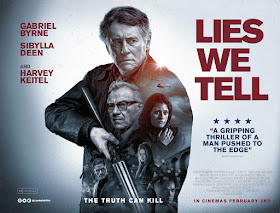And Lies We Tell does have a lot going for it. Ish.
Gabriel Byrne is Donald, world weary driver to shady boss Demi (Keitel). When Demi dies suddenly, his last request is for Donald to visit his home and clear away any traces of Demi's extra marital relationship with a Pakistani girl called Amber (who by day is a trainee lawyer), including an intimate video of them together. Mid clearout, Amber turns up at the house, and an uneasy friendship between the two develops. Amber has been seeing Demi as a way of obtaining money for her legal education, and to free herself from her family, ruled by the vicious and calculating KD, who has links to the Bradford underworld. Amber and KD, who are cousins, were once 'married' on paper to appease the family but agreed not to consummate the relationship, except that KD changed his mind. But any control that Amber has on KD's behaviour vanishes when he turns his attentions to Amber's 16 year old sister Miriam. And Amber has other problems, namely that copies of the incriminating video are still floating around, potentially jeopardising her burgeoning legal career.
 |
| Gabriel Byrne and Harvey Keitel in Lies We Tell |
On the downside Lies We Tell does have a lot of inconsistencies. Bryne seems rather lost in the role of Donald, unsure of his motivation from scene to scene (he just looks tired). And Mark Addy, who plays Donald's friend Billy, looks like he was slated for a much larger part which may have been trimmed during editing - there are scenes between Billy, Donald and Amber that are played out without context.
 |
| Gabriel Byrne at the end of his tether in Lies We Tell |
But while the strands of this film don't all quite hold together, there are some good set pieces, and the vibrant photography of the streets (and clubs) of Bradford contrast well with scenes shot against the city's backdrop of imposing buildings and immaculate formal gardens. This is after all a film about Bradford, so it's perhaps right that Lies We Tell's contrasts are as diverse as the city itself.


No comments:
Post a Comment